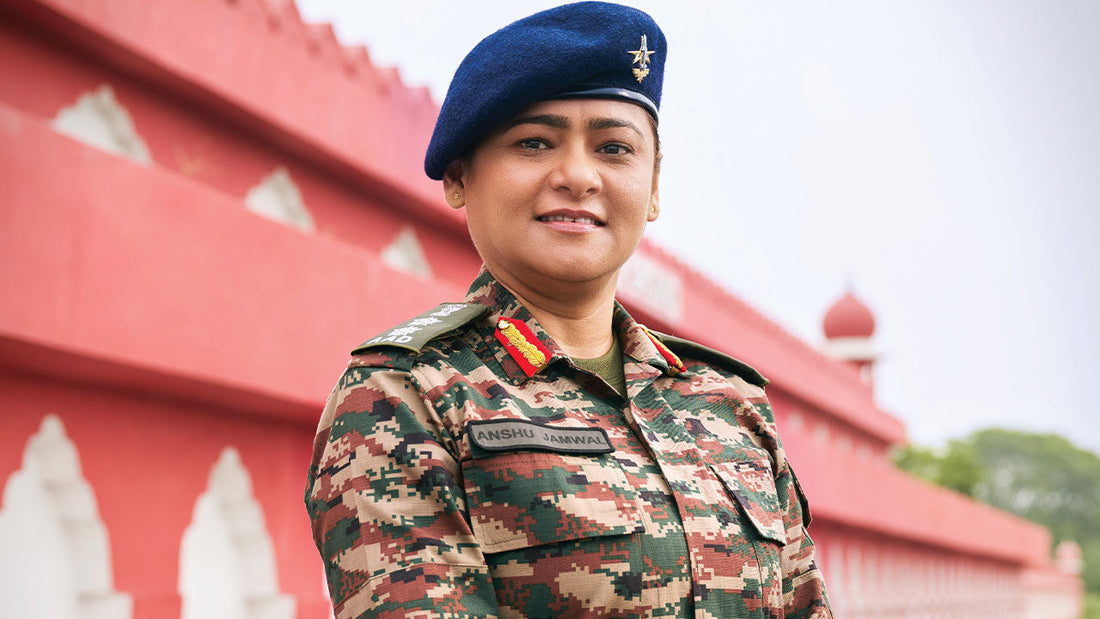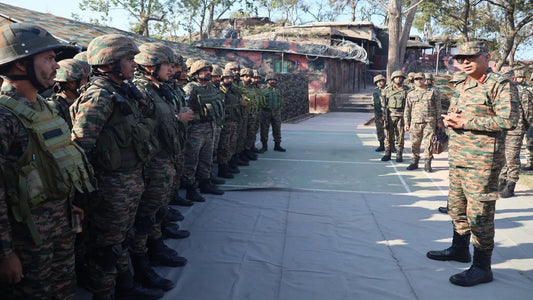Meet Colonel Anshu Jamwal: First Woman Commanding Officer of an Air Defence Unit

In the rugged landscapes of Jammu and Kashmir, where resilience is woven into the fabric of daily life, Colonel Anshu Jamwal emerged as a trailblazer, shattering longstanding barriers in the Indian Army. Her journey from a small village to commanding an operational Air Defence Regiment exemplifies not only personal determination but also the evolving role of women in India's armed forces.
As the first woman to hold such a command, Jamwal's achievement resonates far beyond the military ranks, inspiring a generation of women to pursue leadership in domains traditionally dominated by men. Her story blends unwavering commitment to duty with the quiet strength of familial support, highlighting how individual ambition can drive systemic change.

Early Life & Background
Born and raised in Rahya village, a modest settlement in the Samba district of Jammu, Colonel Anshu Jamwal grew up in an environment that valued education and stability. Her father, Bir Singh Jamwal, a retired government employee, initially envisioned a career in teaching for his daughter, reflecting the family's emphasis on secure, conventional paths for women.
"Initially, we wanted her to become a teacher, but she wanted to do something different," Bir Singh recounted, recalling how he supported her aspirations despite societal norms that often confined women to non-combat roles. Jamwal's early years were marked by a sense of adventure and discipline, fostered in the culturally rich yet challenging terrain of Jammu and Kashmir, where tales of military valor are commonplace.
She pursued her higher education at Government College for Women (GCW) Gandhinagar in Jammu, where she completed her graduation. This period was pivotal, as it instilled in her the academic foundation and resilience needed for a military career. Unlike many who enter the armed forces through prestigious academies like the National Defence Academy, Jamwal's path began in a civilian institution, underscoring her self-driven pursuit of excellence.

Her father's encouragement played a crucial role; he accompanied her during physical training sessions at Govt Gandhi Memorial Science College, counting her laps as she ran, building the stamina that would later define her service. This human element a father's quiet pride in his daughter's unconventional dreams adds a layer of relatability to Jamwal's narrative, making her an emblem of familial empowerment in a patriarchal society.
Historically, women in the Indian Army have roots dating back to 1888 with the establishment of the Indian Military Nursing Service, where they served in support roles during World War I and II. The post-independence era saw gradual inclusion, but it was not until 1991 that women were inducted as officers in non-medical branches. Jamwal's background aligns with this progression, representing the aspirations of women from regional India who seek to contribute to national defense.
Also Read: How to Become a Commanding Officer (CO) in the Indian Army?
Military Training & Commissioning
Jamwal's entry into the military was through the Officers Training Academy (OTA) in Chennai, a premier institution for short-service commissions that emphasizes rigorous physical and tactical preparation. Commissioned on March 18, 2006, she underwent a demanding 49-week program, divided into semesters focusing on leadership, combat skills, and psychological conditioning. OTA's curriculum, tailored for graduates like Jamwal, includes weapon handling, field training, and strategic studies, preparing officers for diverse roles.
Her training was not without challenges; as one of the early waves of women officers in combat support arms, she navigated an environment where gender biases persisted. Yet, Jamwal excelled, demonstrating the physical prowess and mental fortitude required. Post-commissioning, she specialized in the Army Air Defence Corps, a branch responsible for safeguarding Indian airspace against aerial threats like enemy aircraft, drones, and missiles.
This corps, evolved from the Artillery Regiment, plays a critical operational role in modern warfare, integrating radar systems, surface-to-air missiles, and anti-aircraft guns to form layered defenses. Jamwal's commissioning marked the beginning of a career that would challenge the status quo, as women were gradually integrated into such technical and operational units.
Career Highlights
Over an 18-year career, Colonel Jamwal has amassed a portfolio of accomplishments that highlight her versatility and leadership. Early on, she served as an instructor at OTA Chennai and the Air Defence College, where she trained aspiring officers in tactical operations and air defense strategies. This role allowed her to mentor the next generation, instilling discipline and expertise in a field demanding precision under pressure.
One of her standout highlights was her posting at Army Headquarters in New Delhi, where she contributed to policy and operational planning. This exposure to high-level decision-making honed her strategic acumen, preparing her for command responsibilities. Jamwal's career also includes diverse field postings, reflecting the Army's push for gender-inclusive deployments. Her father's presence at her command assumption ceremony in July 2024 underscored the personal milestones intertwined with professional triumphs.
In recognition of her contributions, Jamwal was featured in Femina's Independence Day Special issue in July-August 2025, alongside nine other trailblazing women officers. The cover story celebrated her as a symbol of resilience, quoting her on leadership: “Leadership is not just about giving orders or taking decisions, it is about guiding your team through uncertainty, supporting them, and standing with them when there is intense operational pressure.” This accolade places her among pioneers like Colonel Ponung Doming and Major Dwipannita Kalita, emphasizing the collective progress of women in the forces.
UN Peacekeeping Service
A pivotal chapter in Jamwal's career was her service with the United Nations Peacekeeping Force as a Military Observer in the United Nations Organization Stabilization Mission in the Democratic Republic of the Congo (MONUSCO). Deployed in a conflict zone rife with instability, she monitored ceasefires, facilitated humanitarian aid, and reported on ground situations, often in high-risk environments.
MONUSCO, one of the UN's largest missions, involves protecting civilians amid armed groups and resource conflicts. Jamwal's role required diplomatic finesse and tactical awareness, skills she applied effectively. Women officers like her have been integral to UN peacekeeping since 2004, serving in zones such as Syria, Lebanon, and Ethiopia. Her tenure not only advanced India's global peacekeeping contributions but also demonstrated women's capabilities in international operations, challenging stereotypes and fostering gender-sensitive approaches in conflict resolution.
Upon return, her insights informed Army policies, bridging field experience with headquarters strategy.
Leadership Roles
Jamwal's ascent to leadership roles reflects her proven track record. Prior to her historic command, she held positions involving unit management and operational planning. As an instructor, she led training modules, shaping officers' skills in air defense tactics. Her time at Army Headquarters involved overseeing logistical and doctrinal aspects, where she influenced air defense modernization.
These roles prepared her for commanding an Air Defence Regiment, a unit equipped with advanced systems like the Akash missile and radar networks. The Corps of Army Air Defence, with its motto "Akashe Shatrun Jahi" (Kill the Enemy in the Sky), is vital for protecting vital assets during conflicts, as seen in operations like the Kargil War. Jamwal's leadership emphasizes team cohesion, drawing from her peacekeeping experiences to navigate uncertainties.
Milestone Achievement as the First Woman Officer to Command an Operational Air Defence Regiment
In July 2024, Colonel Anshu Jamwal etched her name in history by becoming the first woman to command an operational Air Defence Regiment. This milestone, announced amid celebrations of Kargil Vijay Diwas, symbolizes the Army's commitment to gender equality. The regiment under her command operates in forward areas, defending against aerial incursions with integrated missile and gun systems.
The operational importance of this role cannot be overstated. In an era of drone warfare and hypersonic threats, air defense units form the first line of protection for ground forces and infrastructure. Jamwal's command involves real-time decision-making, resource allocation, and troop motivation in potentially hostile environments. Her father's emotional response "We are happy that our daughter will command an Air Defence Regiment and she has become the first woman officer to do so" captures the personal triumph amid national significance.
This achievement builds on precedents like Group Captain Shaliza Dhami, the first woman to command a frontline combat unit in the Air Force. For the Air Defence Corps, historically male-dominated, Jamwal's role marks a paradigm shift.
Challenges Faced
Jamwal's path was fraught with challenges, from societal expectations to institutional hurdles. Early family pressures to pursue teaching mirrored broader gender norms in India, where military service for women was limited until recent reforms. Physically, the demands of air defense training handling heavy equipment and enduring harsh terrains tested her limits.
In peacekeeping, she faced dangers in volatile Congo, including armed ambushes and logistical constraints. Back home, balancing career with personal life, especially as a woman in a high-stakes field, added layers of complexity. Gender biases, such as skepticism about women's combat readiness, persisted, but Jamwal overcame them through performance and perseverance. The Supreme Court's 2025 ruling questioning the Army's exclusion of women from certain roles echoes these struggles, affirming capabilities like Jamwal's.
Significance of the Achievement for Women in the Armed Forces
Jamwal's command is a watershed moment for women in the Indian Armed Forces, where representation has grown from nursing roles to command positions. It challenges the notion that women are unfit for operational leadership, promoting inclusivity and meritocracy. In the Air Defence Corps, her role highlights women's technical proficiency in a domain critical for national security.
Broader implications include inspiring recruitment; with women comprising about 3-4% of the Army, such milestones encourage more to join. It aligns with government policies like permanent commissions for women, granted post-2020 Supreme Court verdicts. Globally, it positions India alongside nations advancing gender equality in militaries, enhancing operational effectiveness through diverse perspectives.
Legacy & Inspirational Impact
Colonel Anshu Jamwal's legacy is one of breaking barriers and fostering empowerment. As a role model, she inspires young women, particularly from regional India, to envision military careers. Her story, amplified in media like Femina, reaches beyond the forces, promoting societal shifts toward gender equality.
Her impact extends to policy; by proving women's command capabilities, she paves the way for future integrations. In a nation where "Nari Shakti" is a rallying cry, Jamwal embodies this power, reminding us that true security comes from harnessing all talents. As Bir Singh Jamwal beams with pride, his daughter's journey from village runs to regiment command inspires countless others to dream boldly and serve fearlessly.



















